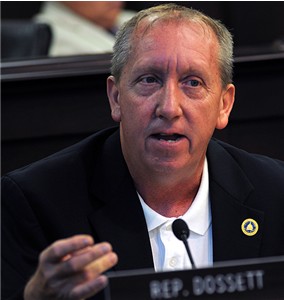
FRANKFORT, Oct 12 (Photo)-- Rep. Myron Dossett, R-Pembroke, expresses concern about the possibility of legalizing recreational marijuana during the Interim Joint Committee on Veterans, Military Affairs, and Public Protection.
FRANKFORT – As Kentucky lawmakers explore ways to pay for public employee pensions, a coalition of law enforcement groups say legalizing marijuana for recreational use isn’t the answer.
“I’m not willing to risk my grandchildren’s health to save my pension,” Kentucky State Police Commissioner Richard W. Sanders said yesterday while testifying before the Interim Joint Committee on Veterans, Military Affairs and Public Protection. “I don’t think that is the right way to go with this thing.”
Sanders is a 40-year law enforcement veteran with 21 years vested in the state’s hazardous duty pension.
Kentucky Office of Drug Control Policy Executive Director Van Ingram testified that marijuana is harmful to society.
“Sixty years ago big tobacco downplayed the risk of tobacco,” Ingram said. “We can see where that brought us: Huge settlements and big changes to that industry. Thirty years ago big pharma told us there was no risk of addiction to opioids. We can see where that brought us: The largest drug epidemic in the nation’s history.”
He added that 10 to 15 percent of people who use marijuana develop addiction issues.
“We are getting led down another path so some folks with a lot better suits than I have can make a lot of money,” Ingram said. “We certainly got enough addiction issues in this state without bringing more to the table.”
Rep. Tom Burch, D-Louisville, however, said Prohibition gave rise to crime …”and criminalizing marijuana has done the same thing.”
National Marijuana Initiative (MMI) Director Ed Shemelya testified that marijuana is legal for recreational use in eight states. He said at least one form of marijuana is legal for medical use in more than 21 states. He said Colorado is on track to sell $1 billion worth of marijuana this year and generate roughly $200 million in tax revenue.
“That’s a lot of money,” Shemelya said. “There is no disputing that.”
But he argued that the bulk of the revenue was being spent on regulating the industry and on harm reduction.
MMI is an arm of the High Intensity Drug Trafficking Area (HIDTA) program administered by the Office of National Drug Control Policy.
Shemelya said the potency levels of marijuana have reached “astronomical levels” since Colorado legalized it. He said the science of what those high potency rates are doing to adolescent brains isn’t in.
A Rocky Mountain HIDTA report found, however, that Colorado youth now rank No. 1 in the nation for past month marijuana use, up from fourth place in 2011-’12 and 14th place in 2005-’06, according to the report.
Smart Approaches to Marijuana (SAM) Director for State and Local Affairs Tony Coder testified that recreational marijuana is becoming a workforce development issue.
“Marijuana users in the workplace have more absenteeism, workplace injuries, more discipline problems,” he said.
SAM is a group founded by former U.S. Rep. Patrick Kennedy and former President George W. Bush speechwriter Kevin Sabet, and its primary focus is on educating the public about the harms of marijuana legalization, according to its website.
Coder said adult past-month marijuana use increased 71 percent in the three-year average since Colorado legalized recreational marijuana compared to the three-year average prior to legalization. He added that the latest 2014-’15 results show Colorado adults ranked No. 1 in the nation for past month marijuana use, up from the seventh spot in 2011-’12.
Rep. Rob Rothenburger, R-Shelbyville, asked how legalized marijuana affected Colorado’s economic growth. The panelists testified that they only had anecdotal evidence that employers were having a hard time finding workers who could pass drug screenings.
Rep. Myron Dossett, R-Pembroke, asked the panelists if workers compensation claims had increased in Colorado but they panelists said they didn’t know those figures.
-- END –









